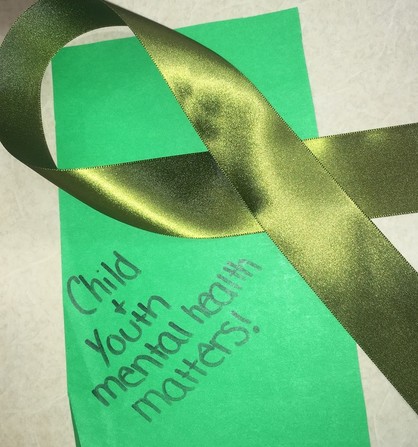The scary truth about declining adolescent mental health Teenage mental health has taken a major downfall over past years.Keri Kipp Pates' Post Editor  The green ribbon to support adolescent mental health. Photo: Keri Kipp The green ribbon to support adolescent mental health. Photo: Keri Kipp Teenagers throughout the United States are now more likely to suffer from mental health disorders than in past times, and also are not getting the correct diagnosis and care that is needed to keep these adolescents safe. “Adolescence is, indeed, a time of transition and change, but severe, dramatic, or abrupt changes in behavior can be strong indicators of serious mental health issues,” said Healthychildren.org. The pressure and problems that teenagers will face throughout these years, will become extremely overwhelming; which can raise concerns as to the child’s mental health and stability. The number of children that have been diagnosed with anxiety or depression has increased by 70% since the 1980’s. “Mental illness does not appear to show signs just because something has happened to you. It’s a chemical imbalance in the brain that someone can’t control. It really upsets me that people with mental illness at this young age feel like they should be ashamed because of it,” said Cassandra Walsh, Parkland junior. Just because a child is going through a small bump in the road, does not mean that he/she is significantly depressed. If this behavior becomes a habit and begins to affect the normal activities or aspects of their lives, this may indicate that the child is battling the depression illness. Although most children do not go without being diagnosed, they do not receive the correct care to help them through their struggles. “When I looked back on all that had happened, I could see that my son's spiral into dysfunction probably occurred over a period of about two years, plenty of time to get him help, if only someone had known that he needed help and known what to do,” said Sue Klebold, while discussing her story “My son was a columbine shooter. This is my story” during a TED talk. Mental illness professionals will most of the time pass off an adolescent as what is called a “normal”. This means that the feelings that they are having are something called “normal emotional and psychological changes” that are happening as they grow. A question that everyone has to be wondering is, what does a teenager with mental health issues experience? The truth is that what each child faces is something that no one would ever wish to experience themselves. It feels like how someone would feel if they were drowning, except everyone around them can breathe underwater and themselves just have not figured it out yet. Anxiety and mental health issues in general is similar to the feeling of someone sitting on your chest when they are already struggling to breathe and keep calm. “I get a little extra pissed when someone uses a mental illness issue at this age as an adjective. Everything that happens to you feels like it could be the one thing to push you over the edge, but you never really know when you’ll break. The worst possible scenario runs through my head all of the time even though I know it’s not reasonable. It’s just how my brain has been wired to work,” said Walsh. “The challenge I have when I talk about my son's murder-suicide is that I'm talking about mental health — excuse me — is that I'm talking about mental health, or brain health, as I prefer to call it, because it's more concrete,” said Klebold. The mental stability of teenagers has decreased and has began to lead them to higher chances of lying, stealing, or being disobedient. It is also shown by studies done by the American Psychological Association (APA) that boys typically have more behavioural problems, while girls have typically more emotional struggles. It is also stated that people who are diagnosed with mental health issues, have also cost the society more than 10 times the amount of people who are stable. This is because unstable people with have difficulties with their relationships, unstable employment positions, and potential involvement in crime. “Past research also indicated that women report more frequent stressful life events than men do before the onset of a disorder, indicating that environmental stressors may also contribute to internalizing,” said the APA. These teenagers battle many things whether it comes to their personal lives, or their performance at school. Sometimes, teens will have no idea since they are not making the connection between a disorder or something that just seems to be pulling away their focus. Some warning signs to keep an eye out for are things such as having an inability to concentrate, a lack of stamina, difficulties within their time management skills or multitasking, being unable to interact with other peers, or struggles when attempting to take constructive criticism. Some young persons will most likely feel alone or feel like they do not fit in because they have “problems”. They will ultimately feel like they should just give up because nothing is worth trying. “Let them know that they are not alone; nor are their anxieties unique,” said Healthychildren.org Some other signs that a child or teen may have depression are irritability or anger, changes in appetite, changes in sleep, fatigue or low energy, vocal outbursts, and feelings of guilt. “The cruel behavior that defined the end of his life showed me that he was a completely different person from the one I knew,” said Klebold.
0 Comments
Your comment will be posted after it is approved.
Leave a Reply. |
Details
AuthorThe Freedom Forum is an award-winning high school publication at Freedom High School in the Bethlehem Area School District in Pennsylvania. The organization publishes approximately 8 issues per school year and reports on local, as well as world, events. Archives
December 2017
Categories |

 RSS Feed
RSS Feed
